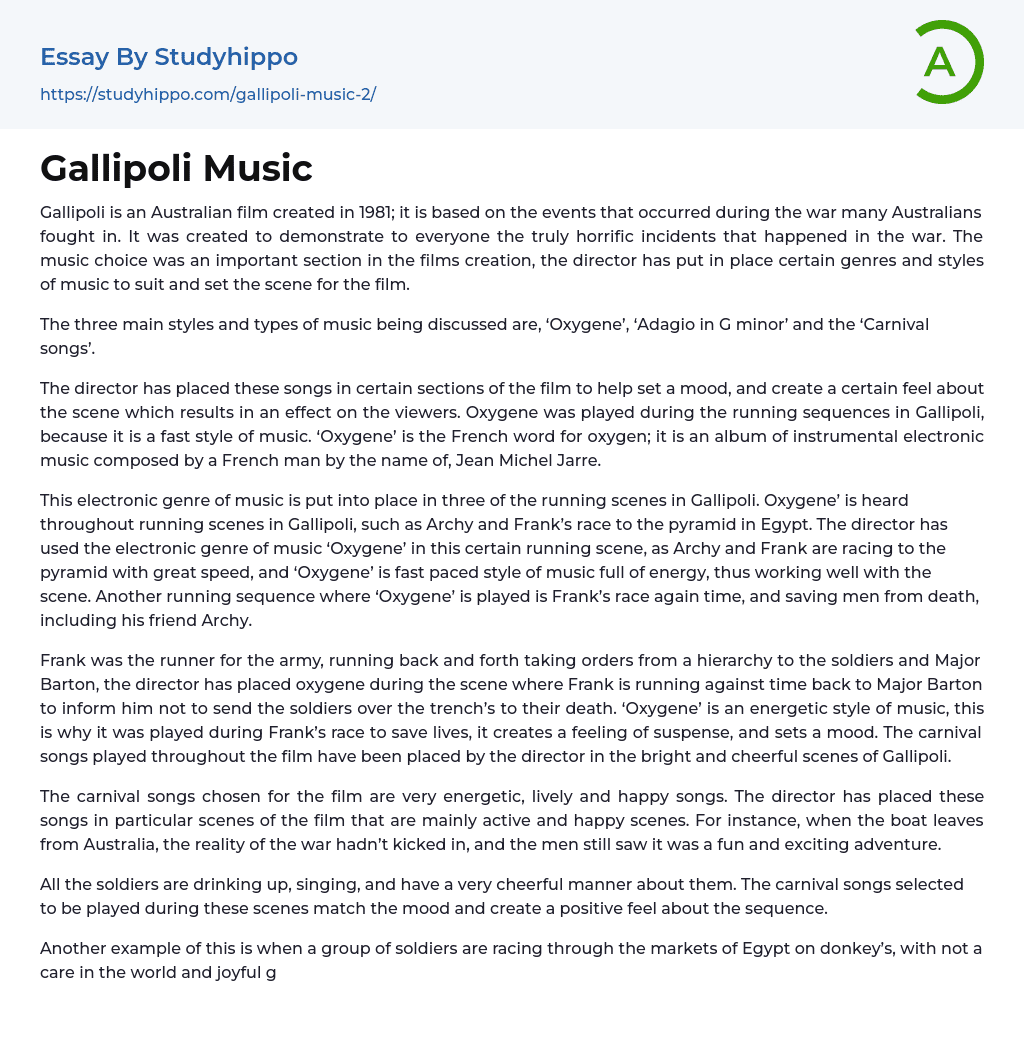Gallipoli is an Australian film created in 1981; it is based on the events that occurred during the war many Australians fought in. It was created to demonstrate to everyone the truly horrific incidents that happened in the war. The music choice was an important section in the films creation, the director has put in place certain genres and styles of music to suit and set the scene for the film.
The three main styles and types of music being discussed are, ‘Oxygene’, ‘Adagio in G minor’ and the ‘Carnival songs’.
The director has placed these songs in certain sections of the film to help set a mood, and create a certain feel about the scene which results in an effect on the viewers. Oxygene was played during the running sequences in Gallipoli, because it is a fast
...style of music. ‘Oxygene’ is the French word for oxygen; it is an album of instrumental electronic music composed by a French man by the name of, Jean Michel Jarre.
This electronic genre of music is put into place in three of the running scenes in Gallipoli. Oxygene’ is heard throughout running scenes in Gallipoli, such as Archy and Frank’s race to the pyramid in Egypt. The director has used the electronic genre of music ‘Oxygene’ in this certain running scene, as Archy and Frank are racing to the pyramid with great speed, and ‘Oxygene’ is fast paced style of music full of energy, thus working well with the scene. Another running sequence where ‘Oxygene’ is played is Frank’s race again time, and saving men from death, including his friend Archy.
Frank was the runner fo
the army, running back and forth taking orders from a hierarchy to the soldiers and Major Barton, the director has placed oxygene during the scene where Frank is running against time back to Major Barton to inform him not to send the soldiers over the trench’s to their death. ‘Oxygene’ is an energetic style of music, this is why it was played during Frank’s race to save lives, it creates a feeling of suspense, and sets a mood. The carnival songs played throughout the film have been placed by the director in the bright and cheerful scenes of Gallipoli.
The carnival songs chosen for the film are very energetic, lively and happy songs. The director has placed these songs in particular scenes of the film that are mainly active and happy scenes. For instance, when the boat leaves from Australia, the reality of the war hadn’t kicked in, and the men still saw it was a fun and exciting adventure.
All the soldiers are drinking up, singing, and have a very cheerful manner about them. The carnival songs selected to be played during these scenes match the mood and create a positive feel about the sequence.
Another example of this is when a group of soldiers are racing through the markets of Egypt on donkey’s, with not a care in the world and joyful grins upon their face’s singing proudly, ‘Australia Will Be There’. Once again the reality of war hadn’t kicked in thus far; the selected song helps to demonstrate this. Throughout the film Gallipoli, the director has put in place three different styles and genres of music to assist in illustrating and creating
certain moods and feelings within the scenes.
The three different styles of music deal with each type of mood that occurs in the film. ‘Oxygene’ was selected for the running scenes, ‘Adagio in G minor’ is played throughout the sad and sombre scenes, and the carnival songs are put into place during the energetic and cheerful scenes. Each of these three genres of music were chosen and placed in appropriate scenes by the director to add to the emotion and mood the viewers feel.
- Band essays
- Baroque Music essays
- Blues essays
- Classical Concert essays
- Classical Music essays
- Concert essays
- Hip Hop essays
- Jazz essays
- Ludwig Van Beethoven essays
- Michael Jackson essays
- Mp3 essays
- Music Concert Report essays
- Music Reference essays
- Music video essays
- Musical Instruments essays
- Opera essays
- Piano essays
- Popular music essays
- Recording essays
- Rock And Roll essays
- Rock Music essays
- Singing essays
- Sonata essays
- Song essays
- Sonnet essays
- Tupac shakur essays




